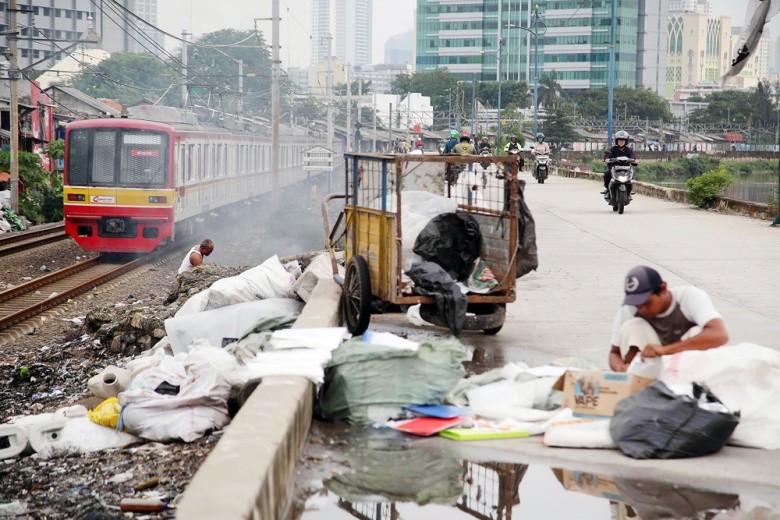Popular Reads
Top Results
Can't find what you're looking for?
View all search resultsPopular Reads
Top Results
Can't find what you're looking for?
View all search resultsMore cash aid, stimuli needed to soften economic shocks of COVID-19: Economists
Low-income households, warung owners and bicycle vendors are the most vulnerable to the effects of the outbreak.
Change text size
Gift Premium Articles
to Anyone
E
conomists have called on the government and businesses to roll out additional stimuli aimed at providing social safety nets, as several communities and workers are expected to feel the pinch of the ongoing COVID-19 pandemic.
According to senior economist Vivi Alatas, low-income households, warung owners and bicycle vendors are the most vulnerable to the effects of the outbreak, adding that there were several ways the government could help them.
“What can the government do? First, with direct cash transfers, as Indonesia already has the experience of disbursing cash and could do it fast enough,” Vivi said via her Twitter account.
“The government could also encourage more people to sign up for BPJS Kesehatan [Health Care and Social Security Agency] such as by giving incentives or discounts for several months so they can pay the premium for third-class services.”
The former World Bank economist also called on the government to provide several other stimuli, including stepping up the non-cash food assistance program, freeing electricity bills for 450 volt-ampere (VA) households and 900 VA as well as removing taxes for micro, small and medium businesses.
Read also: What we can do to help those financially hit by COVID-19: Economist's take
“The government must look at the options based on the possibility and the availability of funds.”
Vivi also called on employers to allow their employees to work from home as well as provide holiday bonuses immediately without having to wait for Idul Fitri or Christmas.
“Companies should also focus on innovation to boost skills […] and roll out massive corporate social responsibility programs to help vulnerable communities.”
The government will reallocate Rp 62.3 trillion (US$3.9 billion) from the 2020 budget to carry out the President’s instructions for tackling COVID-19, Finance Minister Sri Mulyani Indrawati said on Friday.
The allocated sum is a significant increase from the previous estimate of Rp 27 trillion — on top of the Rp 120 trillion stimulus packages — as the government prepares for worst-case scenarios, including the possibility of zero percent economic growth, ministers said.
Separately, Bank Central Asia (BCA) economist David Sumual urged the government to raise the threshold for non-taxable income, something done during the 2008 financial crisis.
“This will be more effective to strengthen purchasing power, particularly for low-income households," he told The Jakarta Post.
Read also: Economics of partial lockdown to contain spread of coronavirus
Bank Permata economist Josua Pardede told the Post that the government may need “far more funds” to anticipate increasing COVID-19 cases and the outbreak’s economic impacts on workers.
“With the planned stimulus, coupled with a projected 2.5 percent budget deficit, the government still has room of Rp 52 trillion to Rp 69 trillion if they need to take more drastic measures,” Josua said.
The government should also prioritize the healthcare system and checks for low-income households, he added.
A group of researchers at the SMERU Research Institute said the government would also need to provide incentives for micro and small businesses, in addition to having integrated data to effectively target the underprivileged.
"Financing access must be expanded and the burden of paying loans must be reduced for micro and small businesses by extending their payment deadlines until the situation improves," the researchers said in a statement made available to the Post.
Read also: OJK relaxes debt payment, loan quality assessments amid COVID-19 pandemic
They added that the government must ensure the availability of goods on the supply side, including raw materials, to protect micro and small businesses from the impacts of the disease.
"The government must also expand fiscal incentives for micro and small businesses that operate in sectors such as transportation, services and trade.”
The government has enough room to lower fuel prices following a decline in oil prices caused by tensions between Russia and Saudi Arabia, the SMERU researchers wrote.
The government’s baseline scenario has been for Indonesia’s GDP to grow more than 4 percent this year, Sri Mulyani said.
Under the assumption that the pandemic would last six months, global trade would slump by 30 percent and the country would go into lockdown, economic growth could fall to between zero and 2.5 percent, she added.
Read also: Jokowi calls for focus on healthcare, safety net as economists push for flexible budget
Sri Mulyani asked ministries to delay any large spending to allow more room for fiscal intervention in light of uncertainties surrounding the pandemic this year.
"This will give us fiscal space for health care and protect the public and businesspeople.”
As of Monday, Indonesia has reported 579 confirmed cases of COVID-19 and 49 deaths. Thirty people who contracted the virus have recovered. Globally, the pneumonia-like illness has infected over 308,000 people and claimed at least 13,000 lives.










